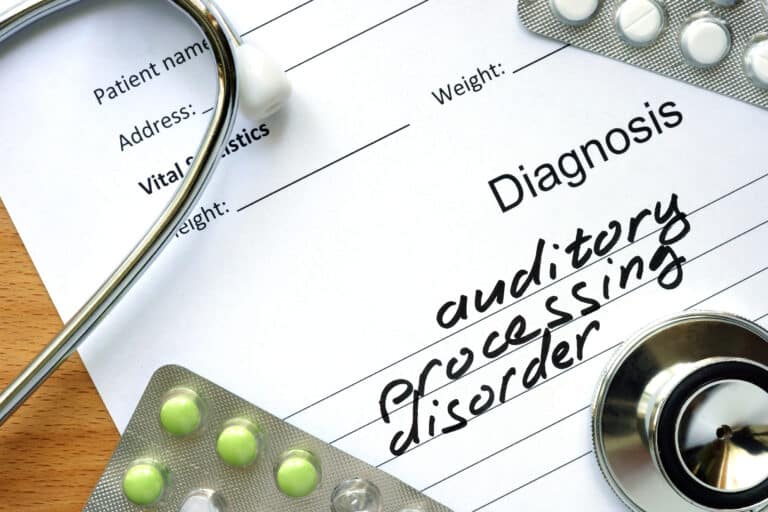
In this blog, we’ll look at Attention-Deficit/Hyperactivity Disorder and the interworking of this common condition:
- What is attention-deficit/hyperactivity disorder (ADHD)?
- How does a person get ADHD?
- Can you develop ADHD?
- What is it like to have ADHD?
- How do you test for ADHD?
- What are the symptoms of ADHD?
- Can ADHD be cured?
- What treatments are available for ADHD?
- How are learning disabilities linked to ADHD?
What is Attention-Deficit/Hyperactivity Disorder (ADHD)?
ADHD is a chronic neurodevelopmental disorder categorized by difficulties paying attention, hyperactivity, and impulsive behavior. The condition directly affects the brain, causing it to form differently from a neurotypical brain.
As of 2022, the CDC cites 6 million American children ages three to 17 with a diagnosis of ADHD.
The brain of an individual with ADHD is different from the atypical brain. Studies show that they have small brain volume, specifically in areas controlling impulsive behaviors and emotional responses.
How Does a Person Get ADHD?

Research shows that ADHD can develop before an individual is born or later in childhood. Newer studies point to ADHD’s ability to show up in adulthood. It’s believed that this disorder can come from genetics or environmental factors.
Can you Develop ADHD?
While environmental risk factors can contribute to ADHD, it is likely in combination with an individual’s genetic makeup.
Possible contributors include:
- Brain injury
- Exposure to environmental toxins (lead, mercury, pesticides)
- Premature birth
- Low birth weight
- Bacterial diseases
- Exposure to alcohol or tobacco in the womb
What is it Like to Have ADHD?
People with ADHD have focus and time management challenges, which can negatively impact school, work, and relationships.
Typically, adolescents or adults with ADHD struggle to focus and prioritize tasks, fall behind on deadlines, or forget plans. Due to the condition causing poor impulse control, a person may act out, experience mood swings, or become angry in certain scenarios (waiting in line, being stuck in traffic, etc.).
The inability to focus leads to zoning out and daydreaming, causing an individual to lose track of time. Organizational issues can lead to messy work and personal spaces that affect the person or those sharing the environment.
How Do You Test for ADHD?

ADHD can look different in each individual who has the condition, but there are typical symptoms used in diagnosis. These are broken into two categories: Inattentiveness and hyperactivity and impulsivity.
According to the Diagnostic and Statistical Manual of Mental Disorders, for a doctor to diagnose ADHD, an individual must meet the following criteria:
- Exhibiting six or more symptoms from each category (0-16 years of age)
- Exhibiting five or more symptoms from each category (17 years of age and older)
- Symptoms have prolonged for at least six months
- Symptoms contradict the developmental stage of an individual
- Inattentive and hyperactive behaviors existed before 12 years of age
- Symptoms exist in multiple settings (home, work, school, etc.)
- Symptoms interfere with daily living
- Symptoms negatively affect school or work performance
- Symptoms negatively affect social life
- Other psychiatric conditions can be ruled out
Symptoms of ADHD
Inattentive Symptoms
- Forgetting deadlines, appointments, or plans
- Struggles to hold attention to tasks or activities
- Easily distracted
- Struggles to keep spaces organized
- Frequently falls through on projects, assignments, and duties
- Reluctance to do time-consuming tasks
- Missing details in school assignments or work,
- Frequently making careless mistakes
- Difficulty concentrating
- Loses things easily (school or work equipment, personal belongings)
Hyperactivity and Impulsivity Symptoms
- Repetitive or unusual movements or sounds (stimming)
- Frequently fidgets or squirms in seat
- Frequently interrupts or intrudes on others in conversations
- Impatient, impulsive behaviors
- Talks excessively
- Struggles to slow down, always “on the move”
- Jumping from one goal or interest to another
- Speaks before thinking, blurting out responses
- Struggles to be passive in activities and projects
- Hyper in inappropriate situations
- Feelings of restlessness
Can ADHD be Cured?

There’s no cure or definite way to prevent ADHD from developing. However, removing certain environmental factors can decrease the effects of the condition (living in poor air quality, exposure to tobacco and alcohol in the womb, etc.).
In rare scenarios, individuals may grow out of ADHD by adulthood as the brain finishes developing (21 to 27 years of age). That said, this isn’t usually the case, and symptoms persist in more than half of diagnoses (50-86%).
What Treatments Are Available for ADHD?
Despite the inability to cure it, there are plenty of treatment options to help manage symptoms and aid in learning and development.
Medication
A doctor can prescribe certain medications to manage symptoms of ADHD. These include stimulants, antidepressants, and non-stimulant atomoxetine. Stimulants (methylphenidate and amphetamine) can increase and balance neurotransmitters in the brain for better focus.
Antidepressants and atomoxetine can treat the psychological impact of the disorder, including anxiety disorders, depression, and mood swings. That said, some antidepressants have been found to aggravate symptoms, so always consult with a mental health professional and keep them updated on the side effects of medication.
Therapies and Education
Different forms of counseling can inform individuals and their loved ones about the effects of ADHD and offer various tools for coping and managing symptoms.
Some of these options include the following:
- Cognitive behavioral therapy (CBT)
- Psychoeducation
- Behavioral therapy
- Training and education for parents of children with ADHD
Skills Training
Different training courses can help individuals with ADHD learn essential life skills for independence and daily living. These programs offer alternative and individual methods to overcome barriers to development.
How Are Learning Disabilities Linked to ADHD?
People with ADHD will likely experience challenges in learning due to the condition’s impact on paying attention and impulsivity. Along with common symptoms, individuals with this condition are likely to have another co-occurring disorder. In fact, a national survey from the CDC found that 6 in 10 children with ADHD had at least one other mental, emotional, or behavioral disorder.






